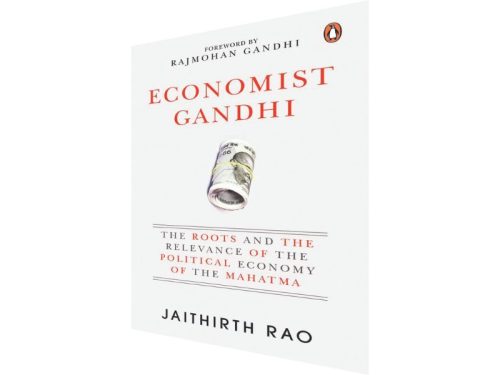Trusteeship philosophy revisited
Economist Gandhi: The Roots & the relevance of the political economy of the Mahatma Jaithirth Rao
PENGUIN PORTFOLIO
Rs.599 Pages 256

The centrepiece of the book is a radical re-evaluation of the crucial concept of trusteeship, which according to Rao contests the conventional view that Gandhi was opposed to capitalism
MAHATMA Gandhi is possibly the greatest and most remembered Indian to have lived since Buddha. His greatness, however, was not in his invulnerability — but in his struggle to overcome his many frailties. Gandhi’s story is an alluring and rare tale of the triumph of human will over seemingly insurmountable odds. It reminds one of Albert Einstein’s famous tribute to Gandhi: “Generations to come, it may well be, will scarce believe that such a man as this one ever in flesh and blood walked upon this Earth.”
One might even suggest that Gandhi’s life was an allegory, his death a metaphor, and his afterlife an unsettled debate. Arguably, no other person in recent memory has been so minutely evaluated as Gandhi. As a result, Gandhi has become, in large measure, a subject of hermeneutical delight; an open book, lending himself to ready investigation and exegesis. Each aspect of his life is closely examined, each word weighed with care, every action measured with precision, every secret is rummaged through with diligence, and even his silences are sought to be interpreted by authors, commentators, critics and admirers alike.
This is in part because — unlike many of his contemporaries — Gandhi did not distinguish between the private and public. He led his life under the glare of the world and whatever could have remained hidden, he revealed it himself by way of his letters, speeches, and voluminous writings, including private correspondence, that he left behind for posterity in almost a hundred volumes.
The fact that Gandhi continues to evince abiding interest is also in part because he — in his life, thought and action — became a curious synthesis of disparate tendencies that were ascendant in India during the 20th century. Tagore’s humanism, Ambedkar’s egalitarianism, Nehru’s materialism and Savarkar’s Hindutva, are all subsumed in Gandhi’s eclectic world view by a somewhat Hegelian-esque dialectic. This explains why Gandhi has so successfully endeared himself to all political ideologies as there is some thing that all can borrow from his vast oeuvre.
In Economist Gandhi, well-known banker, entrepreneur and free markets champion Jaithirth (‘Jerry’) Rao throws fresh light on Gandhi’s economic philosophy. The thrust of the book is the argument that Gandhi can be interpreted as a supporter of big business and capitalism. This is a bold claim, and author Rao is quite conscious of the ambitious task he has undertaken.
The centrepiece of the book is a radical re-evaluation of the crucial concept of trusteeship, which according to Rao can be the basis of this departure from the conventional view that Gandhi was opposed to capitalism.
It is well-known that in Hind Swaraj, perhaps the most important book that Gandhi wrote, there is a well-laid-out case against the capitalist economy which Gandhi believed is based on greed and profit. Yet Rao urges us to dig deeper into the nuances of Gandhian economics, particularly his idea of trusteeship, to suggest that on a careful reading, it is possible to draw some parallels between Gandhi and Adam Smith. Rao also makes the point that the concept of trusteeship in Gandhi — if properly understood — holds the secret to a new management theory, especially relevant to agency problems in decision making.
In an illuminating section, Rao holds that ‘trusteeship’ and ‘trust’ are peculiar concepts of English common law that Gandhi became acquainted with while studying law in England, and that the book, Snell’s Equity, had a profound impact on Gandhi’s thinking.
The basic principle in the idea of trust is that trustees work for the benefit of the cause that a trust represents, and not for individual profit. Capitalists according to Gandhi, suggests Rao, ought to be like trustees — creating and holding wealth, not for individual gain but for the welfare of all. This philosophy, the author argues, may well be Gandhi’s stellar contribution to modern economics and management theory.
Other chapters in the book deal with Gandhi’s views on education, his deep understanding of the Gita, Isavasya Upanishad, the Gospels, Quakers along with some other well-known aspects of his social and political philosophy. On balance, one may say that Economist Gandhi is eminently readable and breaks fresh ground, even though the conclusions drawn may well require more substantive proof and argument than what has been presented.
SYED AREESH AHMAD (The Book Review)

















Add comment